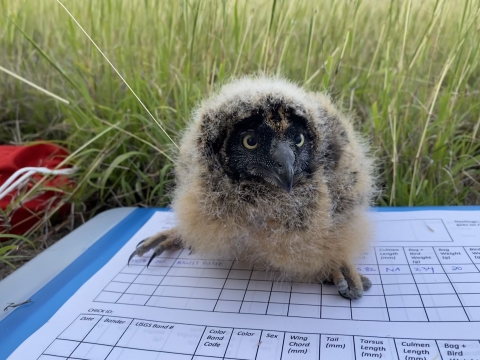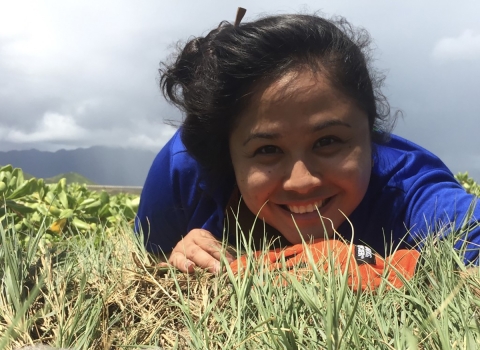When Olivia Wang took a chance and moved to Hawai‘i to attend graduate school, she couldn’t have foreseen how that step into the unknown set the gears in motion, but that’s exactly what happened. From solidifying a field of study and sparking an intense interest therein, to landing an internship with the Pacific Region of the U.S. Fish and Wildlife Service, the dots towards a career in conservation started connecting.
As Olivia steps into her new full-time role of wildlife biologist and coordinator with the Migratory Birds and Habitat program in Honolulu, Hawai‘i, she took some time to discuss the journey that led her to this point and reflected on several significant points along the way. Answers have been edited for clarity and length.
Q: Growing up, what were your thoughts and experiences like in regards to the outdoors?
A: I grew up in a very suburban part of Southern California, so it wasn’t like I had a lot of access to outdoor spaces. My parents weren’t into camping or the outdoors really and they worked full time, so I did not spend much time outside when I was younger. Growing up, I did a lot of things indoors like arts and crafts and music, but I had always been very interested in nature and animals and would watch nature documentaries and TV shows and read a lot. I think nature has always been an interest of mine, but I wouldn’t say I had a lot of outdoor experiences as a kid.
Q: How did that interest as a kid set you on a path towards a career in conservation?
A: I went to college thinking I was going to go to veterinary school, so I was taking all the general biology classes. But as my studies progressed and I was taking higher level ecology and evolution classes, I realized that studying the way that organisms interact with one another and with the environment was really interesting to me. I found it a lot more interesting than chemistry and anatomy! I switched gears to focus more on wildlife biology and ecology, and I had some great mentors along the way among the graduate level ecology students. I saw all the cool research that they were doing and got to work with some of them on their projects. I realized that I could do something with this and pursue it as a field of study and career. I didn’t know that was possible till halfway through college.
After I graduated, I worked for a couple of seasonal field jobs. They were all with birds. I knew I wanted to keep working in avian ecology as I was looking into grad school. The lab I ended up at was focused on raptor breeding ecology in Hawai‘i. I thought it was perfect, I had some prior experience in that area, but I had never thought about moving there. It was an interesting opportunity to work with an island endemic species and learn about a new ecosystem. I knew I wanted to focus on studying birds, but not necessarily where. I was like, “Let’s try this new thing, move to Hawai‘i and see what happens.”
During graduate school at the University of Hawai‘i, I was a Director Fellowship Program intern with the Pacific Region Migratory Birds program. My DFP experience introduced me to key connections here in Hawai‘i and aided in my masters work. The internship also ultimately led me to the role I am in today. It was a really valuable learning experience.
My internship project focused on wedge-tailed shearwater colony mapping and producing outreach products based on the maps I created. It was a fun mix of data management and analysis, creating maps and public outreach which I really enjoy.
Q: Describe your role with the Service.
A: With the Migratory Birds and Habitat program, I am the Hawai‘i biologist and coordinator. Generally speaking, I talk with different entities and do my best to bring people together. It’s a lot of coordinating conservation actions and management. Also, I do a lot of technical advising, which is reviewing reports and management plans to make sure that the best available and most recent science is being used. And lastly, I assist other natural resource organizations around the state with their conservation work and planning.
Something that I am really enjoying about this position specifically is the bridge between more hard science and research but also building connections with people and helping them make the best management decisions that balance both their needs and project goals with the conservation of species that we’re concerned about. I get to do research but also talk to a lot of people to help educate and spread awareness about these animals.
As I began my new role, I was given a general idea of things to focus on, but also really encouraged to see where I fit in and take on work that interests me. This is my first big job after graduate school. It’s been interesting and kind of intimidating, but mostly interesting!
Q: How do you enjoy the outdoors today and what is one of your favorite spots in nature?
A: That is a really good but difficult question. Generally, I really like birding. It goes back to my experience in undergraduate and graduate school. I just love watching birds, even if it’s just a pigeon outside, I enjoy watching their behaviors. I feel like I could watch a bird I’ve seen a hundred times before but notice something different about how they forage or move. They always surprise me in some way and I feel like I learn something new every time I go out and bird.
I go hiking and camping a lot. Spending time outdoors moving my body has been very important to me. Nowadays, being able to get some good outside time and just get away from all the distractions, work stuff and daily life has been really good for me. No matter where I go, birds are everywhere and there’s always a bird to watch and learn something new about. That’s the great thing about birds!
Q: Looking back on your own journey, what advice would you give someone interested in a career in conservation?
A: One of the big things is that the conservation world is so small. You’ll find that a lot of people know each other, so I think it’s really important to be nice to everyone you meet. You never know when you might cross paths with them again. I think that’s just good general life advice, seems kind of obvious right? Butespecially in a field this small it’s important to be kind and understanding. You’re working with a lot of people from different backgrounds and knowledge levels, so being open to all these diverse perspectives and being kind is something that maybe gets overlooked sometimes but will get you far.









